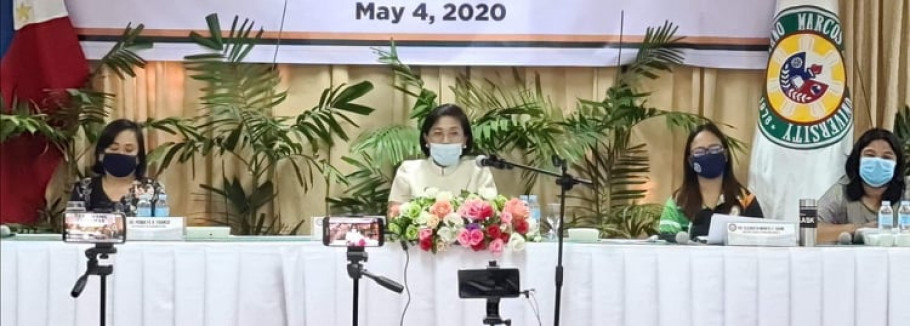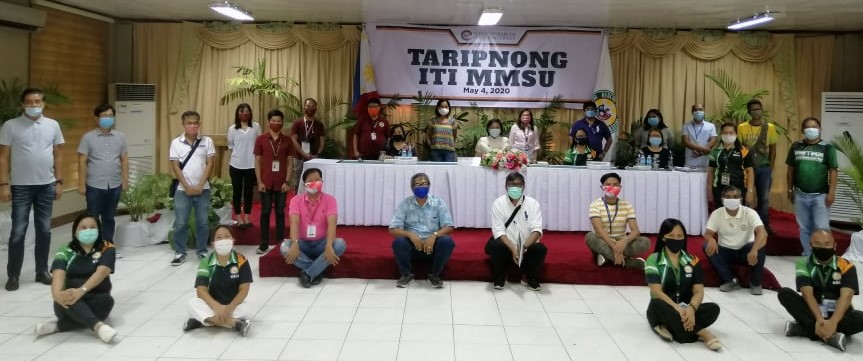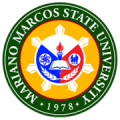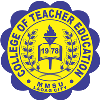
Pres. Agrupis: MMSU recalibrates to face ‘New Normal’
By JOHN VINCENT B. TORIBIO
MMSU President Shirley C. Agrupis highlighted how the university is recalibrating its ways to face the challenges of the ‘New Normal’ brought about by the COVID-19 pandemic.
In a media forum dubbed Taripnong iti MMSU held at the university Function Hall, Dr. Agrupis said MMSU has remained responsive in re-shaping its operations as an academic institution and in helping the government to fight the crisis.
Under the New Normal academic environment, Dr. Agrupis said the university is in the right track of implementing flexible learning among its students, noting that “it is the best instructional strategy at hand to ensure that MMSU still achieves its mission to develop virtuous human capital despite being prevented to meet the learners in person.”
Flexible learning involves a combination of instructional strategies – online and offline, synchronous and asynchronous – which teachers can use to make sure that students still gain knowledge and develop competencies despite not meeting their students in person. This includes accessing websites with interactive content, use of chat rooms and discussion boards, teleconferencing or videoconferencing, videos, reading knowledge resources (e-books) and audio-resources, among others.
With the extension of the second semester of the academic year 2019-2020, “flexible learning as MMSU’s instructional design will be practiced starting on May 4 until the end of the semester on June 3,” she said. In extension, said format will be used for the mid-year term.
When asked if MMSU is ready for such essential shift in instruction, Agrupis said “at first we were not sure if we were ready, especially in line with the university’s academic mandate, but we found ways to know by conducting surveys; with this, MMSU is not ‘zero’ in facing this situation.”
She exclaimed that the results of the rapid survey among the faculty and students fed the university guidelines on the teaching and learning set up.
Clustering students with respect to their media access and use, the university determined students who have gadgets and access to stable internet connection (Cluster A), who have gadgets but with intermittent connection (Cluster B), and who have no single gadget and no access to the internet (Cluster C).
“We wish to coordinate with the local government units in coming up with an arrangement where they could provide the students, especially those who comprise the Cluster C, with a study area and a good internet access in their locality,” Agrupis said.
Noting that, while this idea is yet to be explored, she assured that the faculty will exert extra effort to facilitate the learning of those who belong to cluster C. “Utmost consideration will be observed,” she added.
Consequently, Agrupis said that when students would have no way to cope with the academic work, they would be given an ‘In Progress’ mark at the end of the semester. This will allow them to work on the requirements for a year.
“Students really need to recalibrate their study habits so they could be one with MMSU in fighting this situation,” she stressed.
Dr. Prima Fe R. Franco, vice president for academic affairs, reiterated that faculty members will continue to capitalize on what they have started in the second semester and utilize strategies that best suit their learners.
Saranay: MMSU’s contribution to the government
During the forum, President Agrupis also shared the initiatives of the University in line with the Bayanihan to Heal as One Act (RA 11469) to combat the effects of the coronavirus among the communities.
“As an institution that operates with government funding, MMSU continues to do its best in combatting COVID-19,” she said.
Asked what she thinks is the best contribution of the University, she said that the continued production and distribution of Nipahol is what she could be proud of.
The Nipahol, a 70% ethyl alcohol from fermented nipa sap, is being produced by the National Bioenergy Research and Innovation Center (NBERIC) of the university. After re-focusing the decade-long research of the University on bio-ethanol, NBERIC was able to produce more than 4,000 liters already. These were provided to various organizations and agencies in North Luzon, including the hospitals serving as COVID-19 centers.
Aside from this, President Agrupis said that the University will launch the Plant, Plant, Plant project to enable the University constituents grow vegetables amid the crisis. One hectare of the University is allotted for the project.
Other development efforts presented during the forum were the production and distribution of Personal Protective Equipment (face masks and lab gowns), food rationing to front-liners and donation drives from different organizations and units in the university.
Dr. Elizabeth Marfel Gagni, director of the Office for Student Affairs and Services (OSAS) also presented that the Oplan SAWAR (Students’ Activities, Whereabouts and Recourse) has helped stranded students with weekly relief goods and cash allowance.
She added that an online psychosocial support and counseling is being provided for them and the Oplan Awid program will soon become operational to ferry the students to their home places.
Meanwhile, President Agrupis recognized the power of the media in helping, not only to disseminate information, but also in the pursuit of educational institutions in the country. (StratCom)
Gallery


Dear Valued Client,
We will be introducing our newly upgraded website on October 31, 2024 – offering faster access, improved navigation, and enriched content for students, faculty, partners, and stakeholders. Experience how we cultivate minds and transform futures at MMSU.

 CAFSD
CAFSD CASAT
CASAT CAS
CAS CBEA
CBEA CCIS
CCIS COE
COE CHS
CHS CIT
CIT CTE
CTE COM
COM CVM
CVM Graduate School
Graduate School
 website_442b5c8cb6dbf01263375c24a73906cc.jpg)



